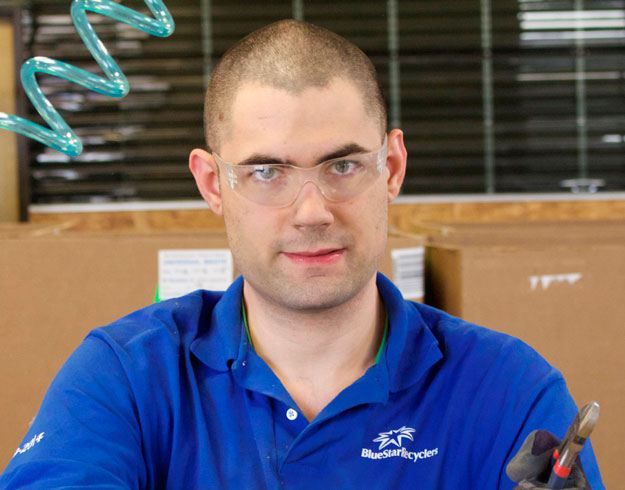SAN JOSE, Calif. (AP) — When high school football coach Kevin Bella needs an intense, heart-to-heart with a player, he goes home and sits on his couch. That's because Bella, who is deaf, communicates with his hearing players most clearly with a new technology that brings a live sign language interpreter to his television screen. The player, on a phone elsewhere, hears the interpreter give voice to Bella's signs.
"It's a huge improvement over typing messages back and forth," said Bella, a defensive coordinator at Mission San Jose High School in Fremont, Calif. "This allows me to work with hearing players, because there's a lot in my language that has to do with expressions. The meaning is lost if sign language is reduced to written text."
Bella is among a rising number of disabled people who are increasingly able to find and keep jobs, as well as engage more broadly in their communities, because of new technologies specifically aimed at helping them better communicate or complete tasks.
The past few years have seen a number of technological breakthroughs targeting disabled consumers. Apple, for example, is incorporating technologies such as voice recognition and screen readers, which can synthesize text into speech, into all of their products, rather than offering them as add-ons.
Applications such as GoTalk NOW and TapSpeak Sequence allow users to combine text, pictures and symbols with audio programs that put voice to thoughts and ideas. Someone who can't speak clearly can touch a picture of a hand, then a book, and the tablet will say: "Please pass me the book."
Blind people can take notes using voice-recognition programs, and listen to emails or "read" a website with screen readers. People with attention deficit disorder can use apps that remind them to stay focused by announcing appointments with lights and sounds. And those with spinal cord injuries share tips on forums such as apparelyzed.com for how to go hands-free on digital tablets using mouth sticks like those mounted on wheelchairs.
"High-tech advances are starting to help level the playing field, opening the door for so many people," said Therese Willkomm of the Institute on Disability at the University of New Hampshire.
Kathleen Martinez, an assistant secretary at the U.S. Department of Labor overseeing disability employment policy, said these advances have translated into higher numbers of disabled people being able to land jobs.
"In the professional careers, technology has helped increase the employment rate immensely. It's actually allowed us to participate in office careers more than ever before," said Martinez, who has been blind since birth.
The unemployment rate last year was 13.4 percent for the 28 million Americans who are deaf, blind or have serious physical, mental or emotional conditions, compared with a 7.9 percent rate for people without disabilities. But a Labor Department survey released earlier this month showed that the number of employed disabled adults jumped close to 4 percent over the past two years, more than the 3 percent gains among nondisabled people.
Meanwhile, unemployment rates among the disabled dropped 1.6 points in a year, a bigger decrease than what was seen among able-bodied workers.
Another factor in the increasing job rates is that baby boomers are retiring later, and today half of the people working over age 65 have a disability, said John D. Kemp, president of the disability advocate nonprofit The Viscardi Center.
"Many people have aged into a disability and are in denial," said Kemp. "But they can't hear as well, can't see as well, and they're using an immense number of assistive devices aimed at retaining valued employees."
The technological advances are a massive upgrade over older, disability-specific clunky devices. Swedish firm Tobii, for example, has developed eye-tracking programs that make it possible for people who can't use their hands to navigate on computers. Instead of moving a mouse, users look into a box that uses a camera and infrared light to track what they're looking at when they blink, triggering a cursor to move.
And Google Glass — a tiny eyeglasses-mounted device capable of shooting photos, filming video and surfing the Internet — has a built-in camera and voice-command capability, meaning disabled wearers could read what people are saying to them or control wheelchairs with their gaze or voices.
The U.S. market for assistive technologies is projected to grow from $39.5 billion in 2010 to $55 billion in 2016, according to analysts at market forecasters BCC Research. And in the past few years, large high-tech firms, including Facebook, have added teams focused exclusively on how disabled clients can use their products.
"Most organizations want to bring their technology and experiences to as many people as possible, so it makes sense to address this," said Jeffrey Wieland, who became Facebook's project manager of accessibility a year ago. The company has even brought visually impaired users to its campus in Menlo Park, Calif., to work with accessibility engineers.
Earlier this month, Rocklin, Calif.-based Purple Communications nationally rolled out a new, upgraded videophone that allows deaf people to communicate using Video Relay Service on high-definition televisions. A live sign language interpreter works remotely to convey messages in real-time via video and audio feeds that transmit into landline phones, cellphones or tablets.







